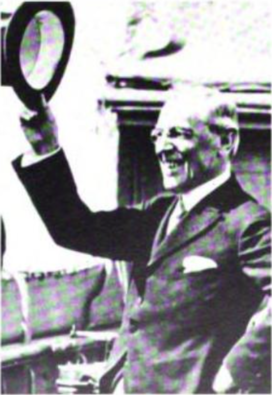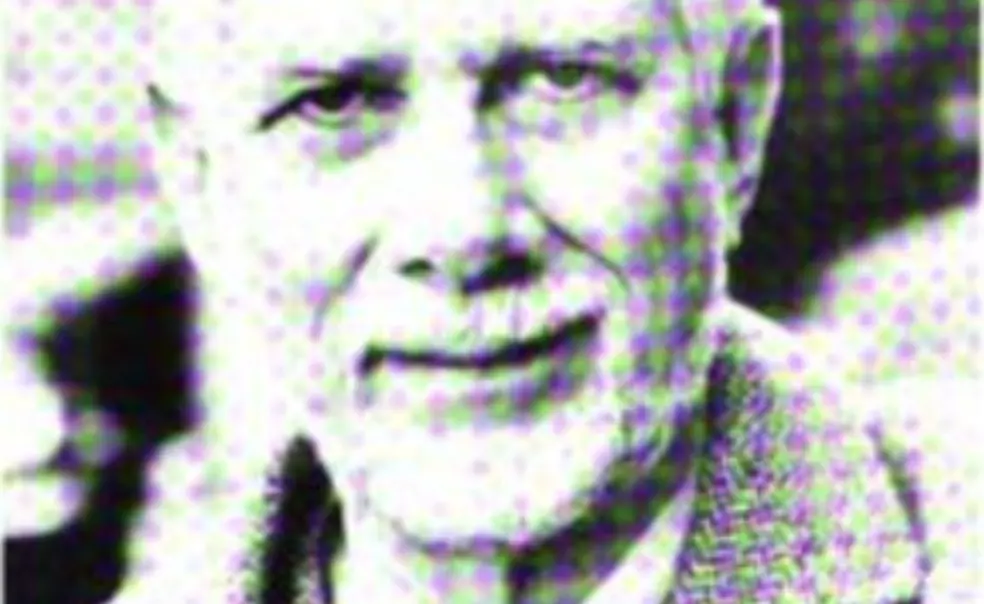Woodrow Wilson ’79: Volcanic Fire From a Thinking Machine
A Review of August Heckscher’s Book: ‘Woodrow Wilson: A Biography’
Not long after he entered politics, Woodrow Wilson acquired the strongest and most misleading aspect of his public reputation. He became admired, respected, and even revered, but at the expense of being liked, appreciated, or correctly understood. No one recognized and regretted this condition more keenly than Wilson himself. In a speech in 1914, he lamented the notion that he was “a cold and removed person with a thinking machine inside…You may not believe it, but I sometimes feel like a fire from a far from extinct volcano.”
Wilson acquired this reputation for complex reasons involving his family background, his personal belief in self-control, and his deep need for privacy, and it has persisted during the nearly seven decades since his death mainly because of two circumstances. One is the sea change in cultural fashion that occurred in the 1920s with the triumph of “modernism,” which left Wilson easy to pass off as a caricature of Victorian repressiveness and facile idealism. The other circumstance has been the lack of a readable, insightful one-volume biography that probes Wilson’s personality and stresses his humanity. Happily, that circumstance has now changed. “Modernism” endures as a threadbare cultural fashion, but at long last there is a satisfactory biography of Wilson the man.

The biography has other strengths to recommend it as well. Though sympathetic in his treatment of Wilson, Heckscher never hesitates to criticize the man, the educator, or the politician. One of the most compelling sections of the books is the account of Wilson’s years as a professor at Princeton and then as its president. The portrait of the rising academic star and devoted but also often overbearing husband and friend of the 1890s is sensitive and moving. The account of the triumphs and struggles of the university president, from 1902 to 1910, is evenhanded and insightful toward the protagonist and his friends and foes. Throughout, one of this book’s signal contributions is its insistent but never reductionist linkage between the private person and the public actor in the worlds of academia, politics, and diplomacy. This is, in sum, the most comprehensive and rewarding single volume to read about Wilson. If you were to read only one book about the twenty-eight president, Heckscher’s Woodrow Wilson should be that book.
Is this, then, as the novelist Louis Auchincloss says in a blurb on the dust jacket, “the definitive life of a great American President”? No, not quite. Perhaps if Heckscher had written about Franklin Roosevelt or Lyndon Johnson, he might have won that biographer’s equivalent of an Olympic gold medal. But not with Wilson. Although Wilson was not a “thinking machine,” he was an intellectual; his was a great political mind, in the same league as Alexander Hamilton, Thomas Jefferson, and James Madison. This book conveys little sense of the content and nuances of Wilson’s political thought, especially as his ideas shaped his action. Fortunately, other books treat that vial center of Wilson’s career, and among them I especially recommend Nils Aage Thorsen’s The Political Thought of Woodrow Wilson, 1875-1910 (Princeton University Press, 1988). At bottom, it makes no more sense to expect a definitive biography of Wilson in one volume than it does to expect the same for Shakespeare of Goethe; even James Boswell fell short of that mark with Samuel Johnson. August Heckscher’s Woodrow Wilson is a superb biography that will provide enjoyment, edification, and inspiration to all readers.
Because this review is written by, for, and about Princetonians, a postscript is in order. Thirty-one years ago, when I was a student in Eric Goldman’s course on modern American history, I complained to him about the book assigned on Wilson. Instead of defending his choice, Professor Goldman told me, “What we really need is a good one-volume biography of Woodrow Wilson.” There is an excellent reason why it has taken so long for such a book to be written. Not until the publication of The Papers of Woodrow Wilson, (Princeton University Press, sixty-four volumes to date) could anyone begin to grasp Wilson in his true variety, depth, and complexity. This great historical, editorial, and literary enterprise, which will conclude next year with the publication of the sixty-ninth and last volume, has already spawned a renaissance of scholarship about Wilson and his era. This biography joins a parade of works that pay tribute to the vision and dedication of those who have produced the Papers series – the Woodrow Wilson Foundation, Princeton University, and, above all others, the editor, Professor Arthur S. Link. Ave atque vale.
This was originally published in the March 18, 1992 issue of PAW.












No responses yet